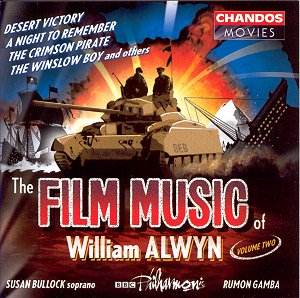William Alwyn (1905-1985) began to write for films
in 1936, first scoring documentaries, then graduating to features in
1941 with Penn of Pennsylvania. Amongst the sixty-nine pictures he scored
are listed some of the most famous British films including those on
this album and The Rake's Progress, The Way Ahead, Green For Danger,
Odd Man Out, Carve Her Name With Pride and Swiss Family
Robinson,
This second volume follows tardily on the highly successful
first volume of Alwyn film music released by Chandos (CHAN
9243) in 1994. The 1994 album included Odd Man Out and The
History of Mr Polly.
The long gap between the appearance of the two volumes
is probably because Philip Lane has had painstakingly to reconstruct
these scores from the original soundtracks because of the shortsightedness
of the film studios which carelessly destroyed most of Alwyn’s scores.
This is an outstanding release in every way and I unhesitatingly
awarded it my Film Music on the Web
Choice of the Month. It has great appeal: a wide variety of styles
and a wealth of melody.
The Crimson Pirate starred Burt Lancaster and
Alwyn’s swashbuckling and romantic music perfectly captures his jaunty
style. From In Search of the Castaways cheeky asides comment
on an elegant ‘Ship’s Waltz’; and the vivacious ‘Rumba’ too, is spiced
with merry nautical vulgarity. In contrast the Green Girdle music
is gently tenderly pastoral (complete with clip-clopping horses) for
the documentary encouraging Londoners, in wartime, to enjoy the Green
Belt areas around the capital. Susan Bullock is passionately pleading
in the dramatic aria that has the title of the film, Take My Life.
Susan is equally intense, when she is joined by Canzonetta, in the powerful
setting of Libera Me from Svengali in which hypnotist
Svengali (Donald Wolfit) manipulates Trilby into being a great opera
singer. The Main Title from A Night To Remember begins with a
heroic aspiring fanfare that gives way to heavy melancholic music over
a surging ostinato redolent of impending tragedy. Desert Victory
has patriotic and heroic music worthy of Elgar and Walton.
From drama to comedy and Alec Guiness’s wonderfully
cheery, chirpy portrayal of Arnold Bennett’s Denry Machin – The Card.
The album includes a five movement suite memorable chiefly for its jaunty
opening theme, first whistled then passed to the clarinets followed
by humorous bassoon and jittery flute and clarinet figures as Denry
rescues a gentleman’s wallet in an early sequence. The suite also includes
a grand waltz and a sparkling polka for ‘The Countess’s Ball’ a romantic
theme tenderly expressed on solo violin and a humorous but cleverly
evocative ‘Coachride to Bursley’. The whole suite is a gem.
Back to drama and stiff- upper-lip English fortitude
as expressed in music that is quite Elgarian with a dash of Eric Coates
yet stamped with Alwyn’s individuality in the Prelude to Terrence Rattigan’s
The Winslow Boy – a cadet accused of stealing and expelled from
the Royal Naval College. The three-movement suite has more introspective
material in its central movement that depicts the Winslow’s at home
– again the Elgarian influence is strong in this beautiful elegiac music.
In the ‘Closing Scene’ the music speaks of triumphal vindication of
the cadet’s innocence, his case is won by defence lawyer Sir Robert
Morton (Robert Donat).
Finally there is a suite from State Secret,
a spy story set in a Ruritanian country. It starred Douglas Fairbanks
Jnr, Jack Hawkins, smokey-voiced Glynis Johns and Herbert Lom. It opens
with some pompous ceremonial material. In addition to some tense suspense
music, there is another waltz for a ball scene, and some high-spirited
circus-like material for ‘Theatre Music’ plus tender nostalgic music
for the lovers’ remembrances of England. This is the best of the least
memorable of these scores.
An excellent well-contrasted compilation of important
British film music that needed to be rescued from oblivion and performed
with panache and conviction.
Ian Lace
Visit the Alwyn
web site

![]() Susan Bullock * (soprano),
Canzonetta*†
Susan Bullock * (soprano),
Canzonetta*† ![]() CHANDOS CHAN 9959[77:29]
CHANDOS CHAN 9959[77:29]